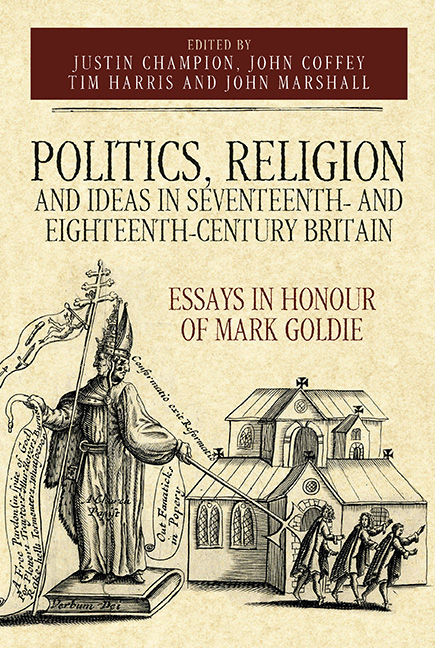 Politics, Religion and Ideas in Seventeenth- and Eighteenth-Century Britain
Politics, Religion and Ideas in Seventeenth- and Eighteenth-Century Britain Book contents
- Frontmatter
- Dedication
- Contents
- Notes on Contributors
- Acknowledgements
- Notes on Text
- Abbreviations
- Introduction: Mark Goldie – An Appreciation
- 1 Constitutional Royalism Reconsidered: Myth or Reality?
- 2 Teaching Political Thought in the Restoration Divinity Faculty: Avant-Garde Episcopacy, the Two Kingdoms and Christian Liberty
- 3 Violence, Protest and Resistance: Marvell and the Experience of Dissent after 1670
- 4 Bulstrode Whitelocke and the Limits of Puritan Politics in Restoration England
- 5 The Assassination of Archbishop Sharp: Religious Violence and Martyrdom in Restoration Scotland
- 6 Compassing Allegiance: Sir George Mackenzie and Restoration Scottish Royalism
- 7 Corruption and Regeneration in the Political Imagination of John Locke
- 8 Locke the Censor, Locke the Anti-Censor
- 9 London, Locke and 1690s Provisions for the Poor in Context: Beggars, Spinners and Slaves
- 10 The Reception of Locke's Politics: Locke in the République des Lettres
- 11 Court Culture and Godly Monarchy: Henry Purcell and Sir Charles Sedley's 1692 Birthday Ode for Mary II
- 12 Thanksgivings and the Signs of the Times: The Apocalypse in the Long Eighteenth Century
- 13 The ‘Secret Reformation‘ and the Origins of the Scottish Catholic Enlightenment
- 14 The Surprising Lineage of Useful Knowledge
- 15 The Vicissitudes of Innovation: Confessional Politics, the State and Philosophy in Early Modern England
- A Bibliography of the Writings of Mark Goldie
- Index
- Studies in Early Modern Cultural, Political and Social History
- Tabula Gratulatoria
13 - The ‘Secret Reformation‘ and the Origins of the Scottish Catholic Enlightenment
Published online by Cambridge University Press: 12 October 2019
- Frontmatter
- Dedication
- Contents
- Notes on Contributors
- Acknowledgements
- Notes on Text
- Abbreviations
- Introduction: Mark Goldie – An Appreciation
- 1 Constitutional Royalism Reconsidered: Myth or Reality?
- 2 Teaching Political Thought in the Restoration Divinity Faculty: Avant-Garde Episcopacy, the Two Kingdoms and Christian Liberty
- 3 Violence, Protest and Resistance: Marvell and the Experience of Dissent after 1670
- 4 Bulstrode Whitelocke and the Limits of Puritan Politics in Restoration England
- 5 The Assassination of Archbishop Sharp: Religious Violence and Martyrdom in Restoration Scotland
- 6 Compassing Allegiance: Sir George Mackenzie and Restoration Scottish Royalism
- 7 Corruption and Regeneration in the Political Imagination of John Locke
- 8 Locke the Censor, Locke the Anti-Censor
- 9 London, Locke and 1690s Provisions for the Poor in Context: Beggars, Spinners and Slaves
- 10 The Reception of Locke's Politics: Locke in the République des Lettres
- 11 Court Culture and Godly Monarchy: Henry Purcell and Sir Charles Sedley's 1692 Birthday Ode for Mary II
- 12 Thanksgivings and the Signs of the Times: The Apocalypse in the Long Eighteenth Century
- 13 The ‘Secret Reformation‘ and the Origins of the Scottish Catholic Enlightenment
- 14 The Surprising Lineage of Useful Knowledge
- 15 The Vicissitudes of Innovation: Confessional Politics, the State and Philosophy in Early Modern England
- A Bibliography of the Writings of Mark Goldie
- Index
- Studies in Early Modern Cultural, Political and Social History
- Tabula Gratulatoria
Summary
In 1800, a Scottish priest published a pamphlet meditating upon the history of Catholic recusancy in Britain, and offering – with uncharacteristic diffidence – a Modest Apology for his co-religionists. Over three centuries, Alexander Geddes opined, a ‘kind of secret reformation’ had swept through the Catholic communities of England and Scotland, with clergy and laity quietly taking it upon themselves to cleanse and regenerate the Church from within. In Britain, the ‘cloud of superstition’ that had once smothered Catholic belief had been ‘quietly dissipating’, so that the ‘still small voice of reason begins at length to be heard’, and recusant society now glimmered with the ‘gentle sunshine of a rational philosophy’. Geddes, a poet, polemicist and biblical scholar drawn from the recusant enclaves in north-eastern Scotland, delivered one of the most consequential but divisive contributions to the campaign for Catholic emancipation. In a succession of treatises that made him briefly the darling of recusant society, he pinpointed British Catholicism as a spearhead of Enlightenment. Having beaten back obscurantist forces within their own Church, he believed, his co-religionists had not merely accommodated themselves to the spirit of the age, but had helped to advance it – and he challenged British Protestants to respond, by stripping the nation of penal laws founded upon ‘zealotism’ and intolerance. Yet, as Mark Goldie has shown, Geddes's vision of continual ‘revolution’ ramified as explosively within his own Church as among his Protestant compatriots. Excoriating clerical celibacy and Latin liturgies, admonishing the papacy and anathematising the religious orders, the ‘disedifying’, ‘libertine’ ‘infidel’ (in some of the more temperate Catholic judgements) took his provocation one step too far by acclaiming the French Revolution as the climax of an age of soaring human potential.
Goldie's scholarly recovery of Alexander Geddes cautions against the more recent tendency of liberal Catholic commentators to turn a ‘wayward’ and vituperative spirit into an irenic herald of the Second Vatican Council. Nonetheless, Goldie has positioned Geddes not simply as a mercurial individualist, but as one voice within the greater panoply of a Scottish Catholic Enlightenment. Through the later eighteenth century, pressures for political and religious reform surged through the ranks of the Scottish secular clergy, connecting Geddes to more orthodox thinkers, including the vicars apostolic George Hay and his own cousin John Geddes.
- Type
- Chapter
- Information
- Politics, Religion and Ideas in Seventeenth- and Eighteenth-Century BritainEssays in Honour of Mark Goldie, pp. 257 - 276Publisher: Boydell & BrewerPrint publication year: 2019
- 1
- Cited by


